





When it comes to investing in the stock market, one of the best resources for beginner investors is books.
There are countless book out there on the subject of the stock market, money, real estate and other finance and investing topics.
In fact, it can be quite overwhelming!
In this article, we will be narrowing down what the best investing books are for complete beginners.
New to investing? Check out my video on how to buy your first stock below!
Robinhood is a popular "all-in-one" investing app.
While they are most well-known for their commission free stock trading, they've recently shaken up the Retirement Investing World too.
Introducing Robinhood Retirement; home of the biggest IRA match on the market.
Here's what you need to know:
And don't worry, this comes with a Portfolio Builder Tool. You don't have to construct your investment portfolio from scratch if you don't want to.
Lastly, you'll even get a free stock worth up to $200 when you open a new Robinhood account using our link.
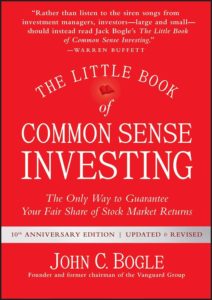
John "Jack" Bogle has done more for the individual investor than anybody else in his time. He was the founder and chief executive of The Vanguard Group.
The best option for the individual investor is to buy and hold low fee, diversified index funds.
When it comes to long-term returns, very few individuals can beat the market. The data shows only about 3% of actively managed funds can beat the market.
Most people would be better off buying and holding an S&P 500 index fund rather than jumping in and out of the market with individual stocks.
The biggest takeaway from the book is to stay away from individual stocks. Instead of looking for the needle in the haystack, and just buy the entire haystack.
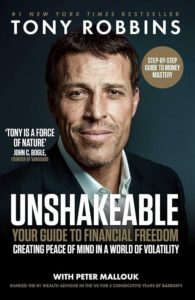
In "Unshakeable" by Tony Robbins, this book outlines an entire step-by-step plan to become financially secure and free.
Whether you’re an employee or a business owner, you can take these steps. This book talks about how to diversify, how to avoid panic, when to buy, when to sell, what to invest in and more.
Through interviews with over 50 successful people in the financial world, Tony Robbins shares with readers how to thrive in the bear market and how to overcome the problem many investors face; fear.
He teaches how to be better financially, but also emotionally, spiritually, and psychologically.
With a meditation technique by Tony Robbins himself, we teaches you how to be filled with gratitude despite the challenges, and always be in a state of calmness.
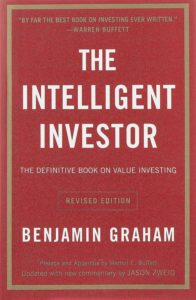
"The Intelligent Investor" by Benjamin Graham is one of the most well known investing books that has ever been written.
Warren Buffet is a big advocate of this book and it has been called the bible on value investing investing by many. It is recommended for people who want to get started in investing or those who have some experience.
The Intelligent Investor is based on value investing, an investment approach Graham began teaching at Columbia Business School in 1928.
Graham introduces the concept of "Mr. Market," a metaphorical figure who offers to buy or sell stocks at different prices. Mr. Market's prices are often irrational, influenced by his mood swings.
Investors should view Mr. Market's offers as opportunities to buy undervalued stocks or sell overvalued ones, rather than following his whims.
Another core lesson from the book is the difference between Investing and Speculation.
An investment operation is one which, upon thorough analysis, promises safety of principal and an adequate return.
Buying stocks without proper analysis or hoping for short-term gains based on market trends rather than company fundamentals is speculation.
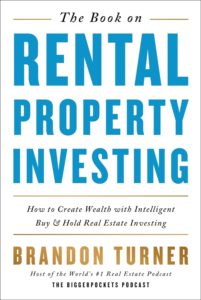
"The Book on Rental Property Investing" by Brandon Turner teaches how to create wealth and build passive income through smart buy-and-hold real estate investing strategies.
Before diving into rental property investing, it's crucial to educate yourself. Understand the basics of real estate, the market, and property management are a great start. This book teaches you exactly that.
Brandon breaks down tips and tricks to be a successful real estate investor. It's written in a “how-to” style making it suitable for beginners and an easy read.
There are different strategies taught to find incredible deals, how to analyze a deal, ways to creatively finance your rental properties and more.
Overall, it’s a great book for real estate investors.
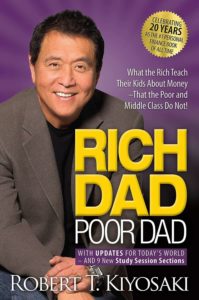
"Rich Dad Poor Dad" by Robert Kiyosaki is a personal finance classic.
This book compares the financial philosophies and practices of two different father figures in the author’s life: his biological father (Poor Dad) and the father of his best friend (Rich Dad).
One of the book's central concepts is the difference between assets (which put money in your pocket) and liabilities (which take money out of your pocket). Rich Dad emphasizes the importance of acquiring assets to build wealth.
Financial literacy is crucial for financial success. Rich Dad teaches that understanding money, how it works, and how to make it work for you is essential.
This is a must-read for anyone on the investing journey.
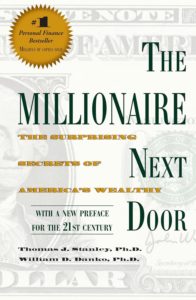
"The Millionaire Next Door" by Thomas Stanley and William Danko is a revealing study of the habits and characteristics of America's millionaires.
The book dispels common myths about wealth and provides insights into how ordinary people accumulate substantial wealth. Many millionaires live modestly and do not exhibit the flashy lifestyle often associated with wealth.
They tend to be frugal, live below their means, and prioritize saving and investing.
In addition, the book teaches that high income does not necessarily equate to wealth.
The authors distinguish between high-income earners who spend their money (under-accumulators of wealth) and those who save and invest their money (prodigious accumulators of wealth).
A key theme is the importance of living below one's means. By controlling spending and avoiding debt, individuals can save and invest more effectively, leading to wealth accumulation.
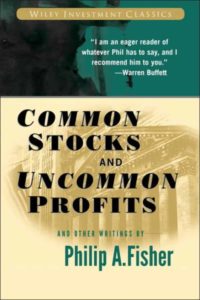
"Common Stocks and Uncommon Profits" by Philip Fisher is a pivotal book on investing that provides timeless principles and insights for investors looking to pick stocks and ultimately try to beat the market.
Fisher's approach emphasizes thorough research, long-term investment, and a deep understanding of the companies one invests in.
Fisher focuses on growth stocks - companies with above-average potential for revenue and profit growth. He believes that the real wealth in investing comes from finding and holding onto these growth companies.
Fisher advocates for the "scuttlebutt" approach to gathering information. This involves talking to customers, suppliers, competitors, and employees to gain insights into a company’s operations, management, and prospects.
This book is a foundational text for investors seeking to develop a disciplined and research-oriented approach to investing.
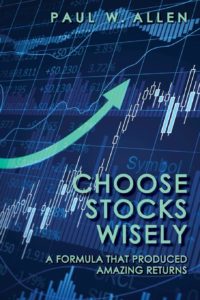
"Choose Stocks Wisely" by Richard Clarke provides a detailed guide to evaluating and selecting stocks for investment.
Clarke presents a systematic approach to stock picking that aims to maximize returns while minimizing risks.
The book emphasizes the importance of fundamental analysis over technical analysis. Clarke argues that understanding a company's financial health and business model is crucial for making informed investment decisions.
Clarke introduces key valuation metrics, such as Price-to-Earnings (P/E) ratio, Price-to-Book (P/B) ratio, and Dividend Yield, and explains how to use them to assess whether a stock is undervalued or overvalued.
Overall, this book provides a practical and systematic approach to stock investing, emphasizing the importance of fundamental analysis, financial health, and valuation metrics.
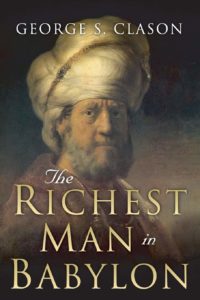
"The Richest Man in Babylon" by George Clason is a timeless classic that offers financial teachings through a series of parables set in ancient Babylon.
The book provides practical lessons on money management, wealth building, and financial success.
One of the lessons is to save at least 10% of your earnings. The first step to building wealth is to pay yourself first by setting aside a portion of your income for savings and investments.
A recurring theme is the importance of financial discipline and prudence. The book emphasizes saving, budgeting, and careful spending as foundational practices for financial success.
The parables offer timeless wisdom and practical advice that can be applied to modern financial challenges. The lessons are straightforward and actionable.
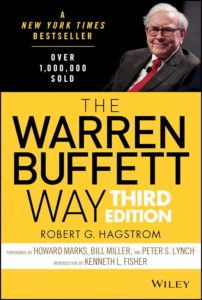
"The Warren Buffett Way" by Robert Hagstrom is a comprehensive guide to understanding the investment strategies and philosophy of Warren Buffett, one of the most successful investors of all time.
The book delves into Buffett's approach to investing, his principles, and the methods he uses to evaluate and select investments.
Buffett's investment philosophy is grounded in value investing, a strategy developed by his mentor Benjamin Graham. This approach involves buying undervalued stocks with strong fundamentals and holding them for the long term.
Buffett determines the intrinsic value of a company by estimating its future cash flows and discounting them to their present value.
He compares this intrinsic value to the market price to find undervalued stocks.
This book provides valuable insights into the investment strategies of Warren Buffett, highlighting his principles, methodologies, and mindset.